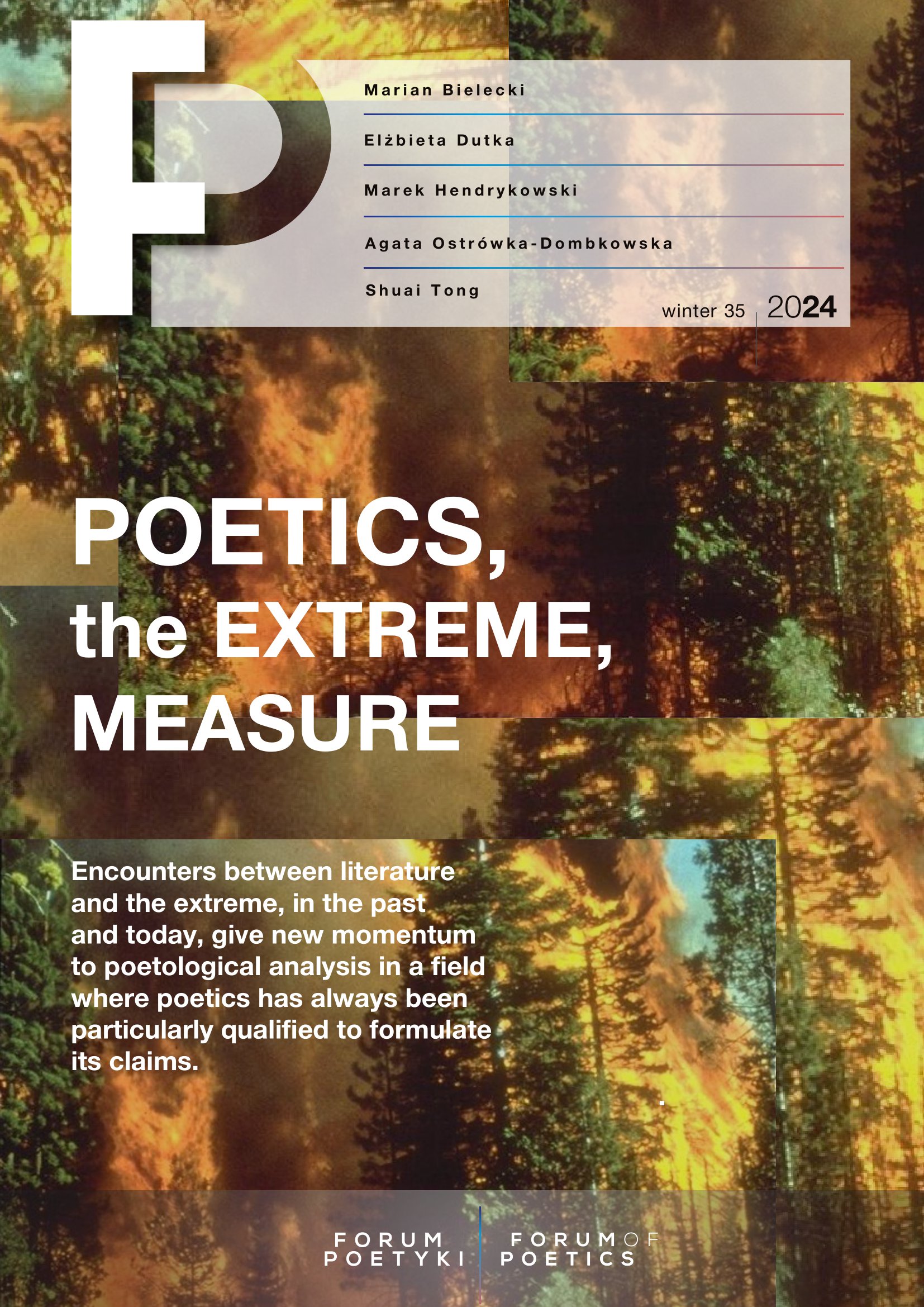Contemporary poetics eagerly undertakes the study of texts which are related to the extreme. In the past, the motivation behind such works was the belief that borderline, transgressive, experiences allow the modern subject to learn something new about themselves, society, and the material world. Later, the extreme was the motivation behind every meaningful text and, for example, in postmodern poetry, the extreme plays of/with language demonstrated how all distinctions are constantly being challenged and redefined. Even though it might seem that today we are long past such eruptions of the extreme, both the term itself and different works of literature provoke poetological reflection on their excessive nature. Poetics once again craves the literary extreme, as it triggers new ways of thinking about writing and its encounters with different realities.
Etymologically, “extreme” means both “the most external” and “of the highest degree.” This complex origin of the word points to the tradition of literary encounters with something that is radically external to the word, something violently different. To this day, the accounts of natural disasters move the reader with reports about a sudden and unpredictable eruption of something of gigantic proportions. Concurrently with this intrusion of externality, however, something less obvious takes place: this externality turns out to constitute something of the highest degree, and therefore challenges all known measures and scales. It forces us to face it, to adjust to it, and consequently to redefine the scales and measures we employ. Indeed, the confusion caused by the climate crisis, including the Anthropocene, may be partially motivated by the fact that, in its radical externality, it also disrupts all proportions and scales. From its very beginnings, literature has asked questions about meter, feet, and rhythm, and its inventiveness in this respect has provided and continues to provide a foundation for literature in general. Extreme poetics reveals its constant attempts to measure and test other scales – they emerge at the intersections of writing and radical externality.
Articles in this issue of Forum of Poetics discuss poetics which emerges as a result of a clash with the extreme. Elżbieta Dutka writes about the visions of mountains in European art history. Othered for centuries, they became a space in which one could come face to face with the extreme experience of climbing that Dutka discusses in a dialogue with Robert Macfarlane. In turn, the Chinese specialist in Japanese studies Shuai Tong proposes an eco-psychological analysis of a text which describes, as if in real time, the experience of a catastrophic earthquake and tsunami which resulted in the destruction of the nuclear power station in Fukushima. The externality and the gigantic scale of the cataclysm forced the characters of the analyzed book to try to face the unknown, to look for new measures and scales in and through literature.
The question of extremity and measure is discussed through a different lens by Katarzyna Szopa. Her book entitled Wybuch Wyobraźni [The Explosion of Imagination], devoted to the poetry of Anna Świrszczyńska, is reviewed by Agnieszka Waligóra. Świrszczyńska’s ecstatic poetry forced her readers to constantly re-scale thinking and sensitivity. Marian Bielecki reflects on the radical experience of disgust found in Thomas Bernhardt’s works. Bernhardt certainly wanted to bring post-war Austria to justice and passionately searched for new scales for the shocking abjectivity of depravity he witnessed there. Marek Hendrykowski tries to capture the poetics of insinuation, the disgusting phenomenon of libelous texts, and in this case, too, he looks for measures which could help one fathom the number of libelous statements prevalent in contemporary autocracies. Agata Ostrówka-Dombkowska describes the poetological phenomenon of parenthesis in Krystyna Miłobędzka’s poetry. An astonishing number of parenthetical sentences, and their sheer excesses, point to the practice of innovatively framing – bracketing – phenomena in and through poetry, thus questioning the scales and measures most deeply rooted in language. Grzegorz Pertek discusses a still different question, as he uses the problem of measures in a comparative description of the evolution of trends in literary studies. He explains how structuralism transitioned into post-structuralism in the West, pointing out that structuralism in Poland was never the subject of an informed discussion which, in turn, turned post-structuralism in Poland into a peculiar phenomenon located in a strange “critical gap” – one which is still looking for measures that could help define it. Finally, Gerard Ronge writes about Jerzy Madejski’s book Poetyka ekstremalna [Extreme Poetics], whose title refers to Andrzej Sosnowski’s postmodern poetry. Meanwhile, as it is revealed in the book, the tradition of Polish structuralism turns out to be equally extreme, because it redefines poetological analysis. Located in the radically external “critical gap” of contemporary literary studies, it fosters an efficient and diligent analysis of artistic forms.
One of the most valuable aspects of literary innovation was, has been, and is related to the fact that it creates new scales, measures, and proportions. Encounters between literature and the extreme, in the past and today, give new momentum to poetological analysis in a field where poetics has always been particularly qualified to formulate its claims.
Table of Contents:
Grzegorz Pertek, A critical gap (in post-1989 Polish theoretical literary studies)
Marek Hendrykowski, Poetics of insinuation






